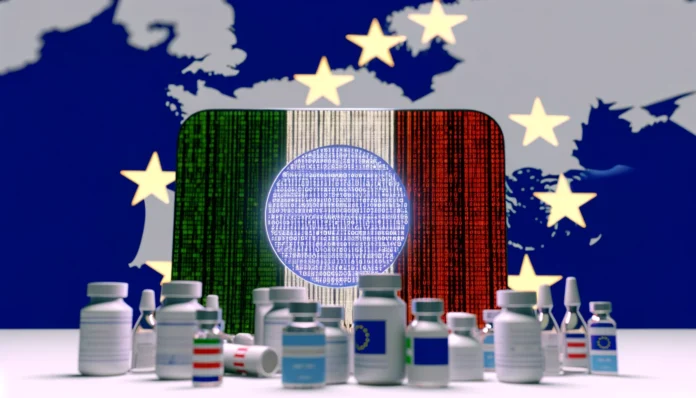As is well known, Italy is a European benchmark for effectiveness in combating pharmaceutical crime (we discussed this in this article). Thanks to the pre-existing adoption of the system based on medicine stamps, our country enjoyed an extension to the application of the Falsified Medicines Directive (2011/62/EU) (amending Directive 2001/83/EC), but the transition to Datamatrix is now imminent. In Law No. 15 of 21 February 2024, the government committed to issue implementing decrees within a year to bring Italian laws into line with the European directive, introducing specific measures to ensure that, by 9 February 2025, all medicines have a unique identification code and a tamper-evident security seal, giving manufacturers sufficient time to update technologically and comply with the new standards.
The transition to Datamatrix
After years of relying on the vignette system, Italy is therefore ready for a significant upgrade in the traceability and safety of medicines. The decision – which is part of a broader context of measures against counterfeiting – follows the commitment made at European level to ensure that all medicines circulating in the EU area are equipped with a Datamatrix code, which contains data crucial to the safety of the medicine, from its identification to its expiry date.
European Medicines Verification System (EMVS)
With the aim of improving patient safety by requiring marketing authorisation holders and manufacturers to put in place a system that prevents falsified medicines from entering the legal supply chain, the European Medicines Verification System (EMVS) was set up, which should ensure the authenticity of medicines through end-to-end verification.
Manufacturers can upload unique identifiers via the European Hub; the verification of medicines will take place in national medicines verification systems. General technical and quality standards – such as system interoperability, ownership and data access – have been agreed by stakeholders based on mutually agreed principles compatible with the requirements of the Falsified Medicines Directive (FMD).
Products that fall under the scope of the FMD are generally all prescription medicines with some exceptions, as specified in Delegated Regulation (EU) 2016/161. Although non-prescription products are largely outside the scope, there are some exceptions and others may be defined per market by the national competent authorities.
Point of dispensing verification
In essence, manufacturers will be required to print a Datamatrix code, incorporating a unique identifier (UI), and to affix a tamper-evident device on the outer packaging of all medicines for each individual sales package. Upon distribution, the medicine will be scanned, checked and verified for authenticity against a national (or supranational) archive. If the user interface on the pack matches the information in the archive, the pack is deactivated and provided to the patient. Otherwise, if there is a warning on the pack, the system will highlight this as an exceptional event and the product will not be provided to the patient. An investigation will then be necessary to determine whether or not the packaging has been falsified.
Introduction to National Responsibilities
With reference to Delegated Regulation (EU) 2016/161 in its Art. 32, the European Commission indicates which structure the repository system should adopt. Thus, it will consist of a central information and data router (the European Hub) and repositories serving the territory of one or more member states. All these repositories will have to be connected to the EU-Hub.
Therefore, each European country (of the European Union, the European Economic Area and Switzerland) must implement a National Medicines Verification System (NMVS) that will be set up and managed by a National Medicines Verification Organisation (NMVO).
The main purpose of the NMVS is to serve as a verification platform that pharmacies or other registered entities, such as wholesalers, self-prescribing physicians or hospital pharmacies, will use to verify the authenticity of a product.
The main objectives of a NMVS
– Store relevant product serialisation data for the national market.
– Receive serialisation data of new/revised products from the EU hub.
– Serve as a verification platform for pharmacies or other registered entities such as wholesalers and hospitals to certify the authenticity of a product.
– To serve as a platform for wholesalers in the case of application by Member States of Art. 23 DR, to mark a product pack as discarded before handing it over to the patient.
– Acting as a platform for wholesalers to mark a product pack as ‘discontinued’, e.g. ‘exported outside the EU’
National Medicines Verification Organisation (NMVO)
With the exception of Italy and Greece, in order to implement the European Medicines Verification System (EMVS), all National Medicines Verification Systems (NMVS) had been connected to the EU hub prior to 9 February 2019, the start date of the operational phase.
In Italy, working under an exemption to the Directive, the non-profit body NMVO Italia Scrl was established by the drug supply chain associations on 17 January.
Signatories to the articles of incorporation were the presidents of the eight founding member associations: for intermediate distributors Federfarma Servizi (Antonello Mirone) and ADF Associazione distributori farmaceutici (Walter Farris); for manufacturers Farmindustria (Marcello Cattani) and Egualia (Enrique Hausermann); for pharmacists Federfarma (Marco Cossolo) and Assofarm (Luca Pieri); for parallel importers AIP (Laura Belli) and AIM (Dario Spinosa). The company’s Board of Directors is chaired by Massimo Gaiotto of Farmindustria.


